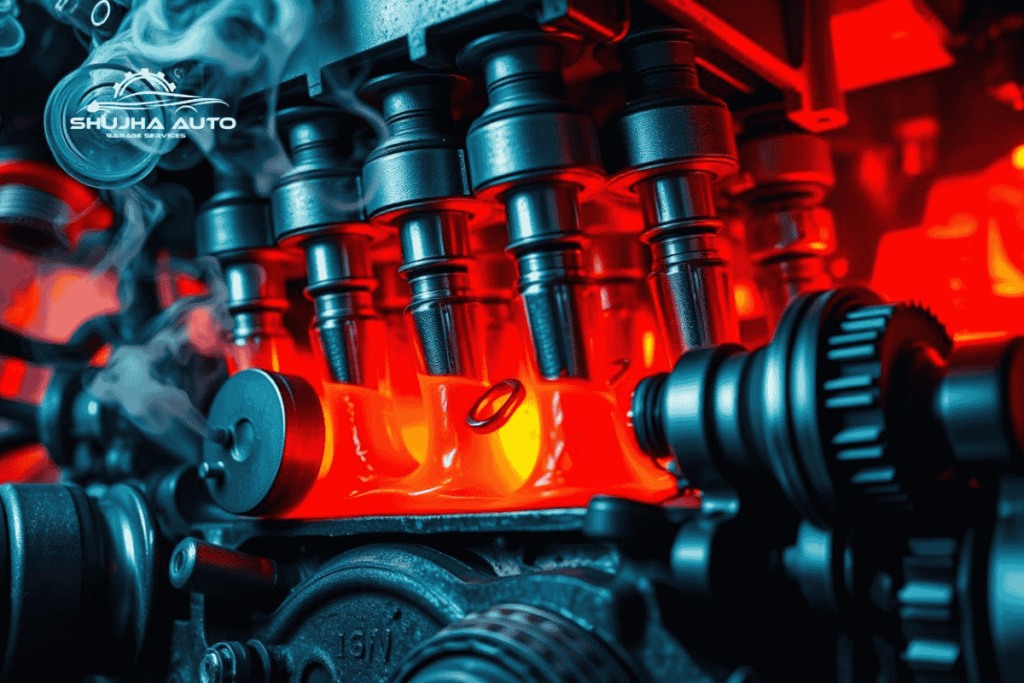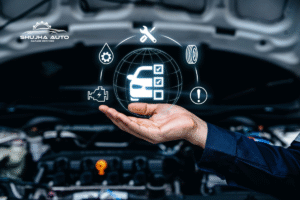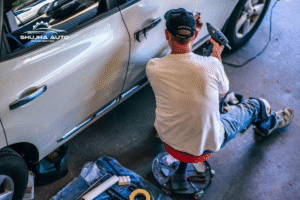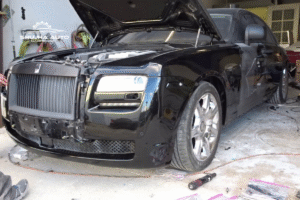Every vehicle owner needs to know how vital engine coolant is. If the coolant level is low, it can cause severe damage to your engine. This damage can hurt your car’s performance.
The engine needs coolant to keep the temperature right. If there’s not enough coolant, the engine can overheat. This can harm your engine badly.
We will discuss why engine coolant is so important and examine what happens if you ignore it. Ignoring it can really hurt your car’s performance.
Key Takeaways
- Engine coolant is essential for maintaining optimal engine temperature.
- Low coolant levels can lead to severe engine damage.
- Overheating poses a significant risk to your vehicle’s performance.
- Regular checks of engine coolant levels can prevent significant issues.
- Understanding the engine coolant’s role is key to prolonging engine health.
Understanding Engine Coolant
Engine coolant is key to keeping your car’s engine running well. You might see different types, like ethylene glycol and propylene glycol. Each type helps keep the engine at a safe temperature.
The coolant’s function is to remove heat from the engine and protect against corrosion and buildup. Knowing how coolant works helps you see its value in keeping your car running smoothly.
Another essential aspect of coolant is how it handles temperature changes. It keeps the engine from freezing or boiling in extreme weather. Maintaining the proper coolant level and choosing the right type are crucial for your car’s performance and life.
How Low Engine Coolant Affects Your Engine
Low coolant levels can significantly impact your engine’s performance, causing it to overheat. Coolant keeps the engine at a safe temperature, helping it run smoothly.
When coolant levels are low, the engine can’t cool down properly. This makes engine parts work too hot. This can stress the engine and even damage it.
Coolant moves through the engine, taking heat away and cooling it down. With low coolant, this process fails, putting the engine’s parts at risk.
It’s crucial to keep the coolant level in your car right. Not doing so can lead to expensive repairs. Checking the coolant regularly helps protect your engine.
Signs of Low Engine Coolant
Spotting low coolant signs early can prevent significant engine damage. An illuminated temperature warning light on your dashboard is a clear sign. If you see this light, act fast.
Steam rising from your engine is another sign of low coolant. This steam is a severe warning that needs quick attention. Ignoring it can cause your engine to overheat, leading to more problems.
Unusual engine noises, like knocking or rattling, also warn of trouble. These sounds are essential warning indicators that your engine needs a check. Watching for these signs helps keep your vehicle running smoothly and ensures the proper coolant levels.
The Role of Engine Coolant in Engine Health
Engine coolant is key to keeping your engine in top shape. It helps keep the engine at the right temperature, a process called thermoregulation. The coolant cools down if the engine gets too hot, preventing damage.
But coolant does more than just control temperature. It also fights corrosion, which can harm engine parts. This protection helps your engine last longer and work better.
Having enough coolant is essential. It helps manage the engine’s heat, keeping it running smoothly. Regular checks and upkeep are necessary to keep your engine running well and lasting longer.
Location: Please Visit Our Shujha Auto Garage
Potential Risks of Low Engine Coolant
Keeping your engine coolant at the right level is key for your car’s health. Low coolant has many risks, including serious engine failures. If coolant levels are low, your engine might overheat.
An overheated engine can lead to big problems, like a complete breakdown. This is a serious issue.
Low coolant also harms important parts like the head gasket and radiator. A damaged head gasket can cause leaks, which make engine problems worse. Damage to the radiator means it can’t cool your engine well, making things even more challenging.
Knowing these risks helps you remember to check your engine coolant often. This simple action can save you from expensive repairs and keep your car running well.
Overheating and Engine Damage
When an engine overheats, it can lead to serious problems. The risks of overheating are high, and various engine damage types can occur, which can hurt your vehicle’s performance.
Warped cylinder heads are a common issue. They can make things worse over time.
It’s important to know how coolant failure impacts overheating. A drop in coolant levels exposes the engine to higher temperatures, speeding up wear and tear on important parts.
Checking your coolant levels regularly is key. It helps prevent overheating risks.
In summary, make sure to check your engine coolant often. This helps avoid severe engine damage. Keeping your vehicle cool ensures it lasts longer and keeps you safe on the road.
Common Engine Problems Linked to Low Coolant
Keeping the proper coolant in your car is key to avoiding engine problems. If the coolant is too low, your engine can overheat, damaging parts and hurting your car’s performance.
Low coolant can also cause head gasket failure. The engine gets too hot without enough coolant, leading to leaks or damage. A cracked engine block is another risk from too much heat. This can make your car break down, showing why checking the coolant is essential.
- Overheating issues that compromise engine integrity
- Reduced engine efficiency affecting fuel economy
- Head gasket failure leading to costly repairs
- Cracked engine block resulting from prolonged high temperatures
Knowing about these problems can help you prevent them. This will prolong the life of your engine and improve the performance of your car.
Head Gasket Failure Explained
Understanding head gasket failure is key to keeping your vehicle running well. It often happens when the engine gets too hot because of low coolant levels. You might see white smoke from the exhaust or notice much coolant loss without leaks.
These signs usually mean the head gasket is failing. The main reason for this failure is too much heat from a cooling system that’s not working correctly. The engine can’t cool down properly when there’s not enough coolant, putting much stress on the head gasket.
When the head gasket fails, your engine’s performance drops. It also can’t compress air, which means less power and efficiency. Fixing this problem can be expensive, with costs for parts and labour adding up fast.
It’s essential to catch these symptoms early. Regular checks and monitoring of coolant levels can help avoid this issue. This will keep your engine running smoothly and save you money in the long run.
Cracked Engine Block: A Serious Consequence
A cracked engine block is a big problem for your car. Low coolant levels can really hurt your engine, and the engine block is very sensitive to this.
When coolant levels drop, your engine gets too hot. This can cause metal cracks. These cracks can leak coolant, making things worse.
It’s essential to know the signs of a cracked engine block. Look out for:
- Coolant puddles under the car
- Unusual engine vibrations
- Inconsistent temperature readings on the dashboard
Fixing these low coolant risks quickly can prevent expensive repairs. If you think your engine block is damaged, get help fast. This can prevent more significant problems later.

Radiator & Water Pump Damage
Low engine coolant levels can cause significant radiator issues and lead to water pump failure. Both are key to your car’s cooling system. If the coolant level drops, your car might not cool down, leading to overheating.
It’s essential to watch for signs of cooling system problems. Look out for:
- Visible leaks around the radiator or water pump
- Poor heating performance inside the vehicle
- Increased engine temperatures
These signs mean your radiator or water pump might be damaged. Fixing these problems fast can prevent bigger and more expensive repairs later.
Minimizing Engine Wear & Tear
Proper coolant management is key to minimizing engine wear. Regular coolant checks and timely changes protect engine parts and extend your vehicle’s life. Good engine maintenance practices boost performance, keeping your engine running smoothly.
Here are some essential longevity tips to remember:
- Check coolant levels often to avoid overheating.
- Use high-quality coolant that fits your vehicle’s needs.
- Flush the cooling system as needed to clear out dirt.
- Look for leaks in hoses and connections to keep coolant flowing well.
Following these steps protects your engine and keeps your car reliable, helping minimize wear. Prioritizing engine maintenance keeps your vehicle in top shape.
Regular Maintenance Tips for Engine Coolant
Proper engine coolant care is key to keeping your vehicle in top shape. To keep your engine running well, follow these essential tips:
- Check your coolant levels often. Look for leaks or colour changes that show a problem.
- Flush the radiator as needed. This keeps the system working right and stops overheating.
- Use the proper coolant for your car. Check the owner’s manual for the correct type.
- Keep an eye on when you need to service your cooling system. This can prevent big problems later.
Following these easy maintenance steps can make your engine last longer. Regular checks are a big part of keeping your car running smoothly.
How to Check Your Engine Coolant Levels
Checking coolant levels is key to keeping your car running well. First, find the coolant reservoir under the hood. It’s usually marked and might be transparent, so you can see the coolant inside without opening it.
If the reservoir looks low, you need to add coolant. Always check your car’s manual to see what coolant it needs. Wearing gloves when you do maintenance helps keep you safe from harmful chemicals.
Make sure the engine is cool before you open the reservoir cap. Hot coolant can splash out and burn you badly. Here’s how to check your coolant levels:
- Look for reservoir lines showing the minimum and maximum coolant levels.
- Check if the coolant level is where it should be.
- If it’s low, carefully remove the cap and add the proper coolant to get it to the right level.
- Put the cap back on when you’re done.
Checking coolant levels often helps your engine run better and lasts longer. Taking care of your car now can save you money on repairs later.
Conclusion
Keeping the correct engine coolant is key for your car’s health and performance. We’ve talked about how vital coolant is. It keeps your engine from overheating and getting damaged.
Knowing when your coolant is low is very important. If it gets too low, it can cause significant problems, such as head gasket failure or damage to the radiator.
Understanding coolant management helps keep your engine running well, which means it will last longer and work better. Regular checks and maintenance are essential to avoid problems with low coolant.
Focusing on coolant protects your engine now and in the future. It’s a smart move that keeps your car running smoothly and saves you money in the long run.
FAQ
Can low engine coolant cause my engine to overheat?
Yes, low engine coolant can cause overheating. When coolant levels drop, your engine can’t cool down properly. This can lead to serious problems like cracked engine blocks or head gasket failure.
What are the symptoms of a failing head gasket?
Signs of a failing head gasket include white smoke from the exhaust and coolant loss without leaks. You might also notice the engine misfiring. If you see these signs, check your car to avoid more damage.
How does a cracked engine block happen?
Low coolant levels can cause overheating, cracking the engine block. This can wear down the engine, so it’s important to check your coolant levels often to avoid this.
What are the risks of radiator and water pump damage?
Damage to the radiator and water pump can cause overheating and lower engine efficiency. Look out for coolant leaks, poor heating, and strange noises. Regular maintenance can prevent these expensive repairs.
How can I minimize engine wear and tear related to coolant issues?
To reduce engine wear, check coolant levels often and replace it as needed. Watch for leaks or overheating. Keeping up with maintenance helps keep your engine healthy.
What should I do if my engine overheats?
If your engine overheats, turn it off right away to avoid damage. Let it cool down, then check the coolant level. If it’s low, refill it and have a mechanic check your car for damage.
How do I check my engine coolant levels?
Find the reservoir in your engine bay to check coolant levels and look at the level indicator. Make sure the engine is cool before opening the cap. Always use the proper coolant for your car.
What types of engine coolant should I use?
The coolant type depends on your car’s make and model. You can choose from ethylene glycol or propylene glycol-based coolants. Both protect against corrosion and extreme temperatures.
Can low engine coolant affect my vehicle’s performance?
Yes, low coolant can hurt your car’s performance. It can cause overheating, lower fuel efficiency, and wear down engine parts. Regular checks and maintenance are key for good performance.








